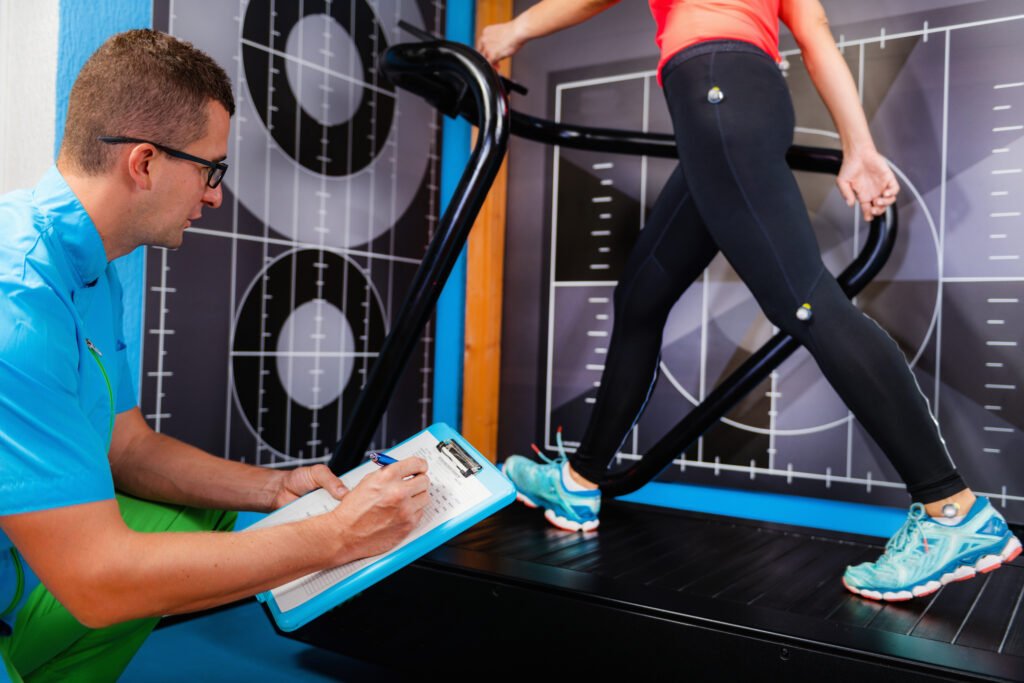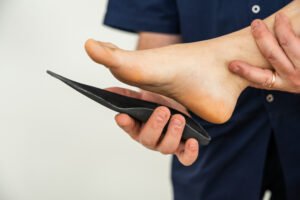Custom Orthotics
What is a Custom Orthotic?
Custom orthotics are custom made insoles designed to treat specific foot conditions. They are used to treat many conditions such as: heel pain, forefoot pain, bunions, big toe pain, hammer toes, Morton’s neuroma, metatarsalgia, diabetic feet, leg length differences, ankle pain, shin pain, knee pain, lower back pain, plantar fasciitis, Achilles tendinitis, pes planus (flat feet), pes cavus (high arch feet), rheumatoid arthritis, corns/calluses and pediatric conditions, to name a few.
The Process

- Initial Assessment – At this appointment our chiropodist will perform a history, biomechanical assessment and gait analysis. The information gathered is used to come up with a diagnosis and treatment plan. The chiropodist will go over all suggested treatments, including if custom orthotics would be appropriate. Your footwear will also be assessed, and further footwear recommendations will be made.
- Casting – If custom orthotics will help treat the condition, a mold of the feet is taken. St. Catharines Foot Clinic uses a digitial 3D mold using a structure sensor. This is a cutting edge method of acquiring an extremely accurate image of the feet in their ideal “neutral” postition.
- Manufacturing – The casts are then sent the lab for manufacturing. A positive image of the feet are made. Once these positive molds are made, the selected materials are heated and vacuum pressed over the molds. Then the orthotics are modified to spec, which results in truely custom orthotics.
- Fitting Appointment – At this appointment, the orthotic fit is assessed, and the orthotics are fit into the shoes. The break-in process is explained and the orthotics are dispensed.
- Follow-up – It is important to ensure that the condition being managed is improving. Sometimes additional treatments are needed. Sometimes custom orthotics need to be adjusted, which is done for free with St. Catharines Foot Clinic.
What Makes a Good Orthotic?

We get this question a lot. This is not a quick answer as there are several factors that go into making custom orthotics – all of which affect the outcome. Not all orthotics are made the same – far from it.
- Training – Chiropodists are foot specialists. It is important to get specialized foot products, like custom orthotics and orthopedic shoes from professionals who understand the biomechanics and pathomechanics of the foot.
- Casting Technique – There are many ways to cast for orthotics; some good, some bad. The gold standard is a 3D non-weightbearing subtalar neutral cast. The only casting techniques that achieve this are 3D structure sensor, 3D laser scan and plaster cast. We use a 3D structure sensor.
- Manufacturing Lab – The labs who make custom orthotics have various techniques and standards. We use a PFOLA certified lab, which is highly regarded in Canada.
- Shoes – The shoes that are mated with the custom orthotics have a direct influence on their overall effectiveness. The right shoes will be recommended by our chiropodist.
- Adjustments – St. Catharines Foot Clinic stands behind our custom orthotics. We use gold standards in making them, and adjustments are made for free if needed. Many of the adjustments are made in our on-site lab.
What Kind of Custom Orthotics Do You Make?
The materials used and the overall design is customized to meet individual needs, based on foot type and condition being treated. There are generally two types of custom orthotics:
- Functional Orthotics – These custom orthotics are designed to control or change biomechanics. If a foot is flat and needs to be supported, we would use a functional orthotic to do this. What makes this type of orthotic able to control foot mechanics is a firm “shell” material. Functional orthotic shells are made of heat moldable polypropylene, carbon or graphite material, and are typically covered with a soft cover.
- Accommodative Orthotics – These custom orthotics are designed to offload high pressure areas, to distribute weight evenly through the feet and to improve proprioception. They are best for conditions that require a lot of cushion, like diabetes and rheumatoid arthritis. They are made of softer materials like various EVA foams and cork.
Insurance Information
Custom orthotics are covered under many extended insurance plans. Extended insurance plans will ask for certain documents to support your claim including a prescription, examination findings, casting method and manufacturing lab information. We provide all necessary documents at your fitting appointment.
